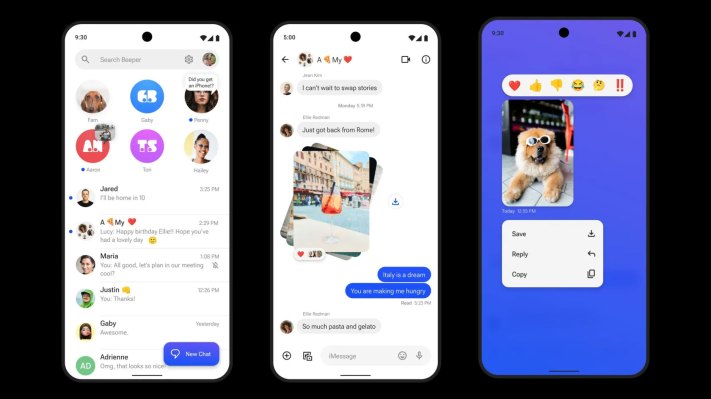Apple’s move to cut off Beeper, the app that brought iMessage to Android users, already caught the attention of U.S. Senator Elizabeth Warren, who called out the tech giant for anticompetitive behavior. Now, a bipartisan group of U.S. lawmakers is asking the U.S. Department of Justice to investigate Apple’s “potential anticompetitive treatment of the Beeper Mini messaging application,” noting that “interoperability and interconnections have long been key drivers of competition and consumer choice in communications services.”
The letter is addressed to U.S. Assistant Attorney General Kanter and signed by Sen. Amy Klobuchar, Sen. Mike Lee, Representative Jerry Nadler and Representative Ken Buck. In it, they note that the Dept. of Commerce had earlier this year described Apple as a “gatekeeper” with a “monopoly position” in its mobile app ecosystem. They also referred to Beeper CEO Eric Migicovsky‘s testimony in December 2015 before the Senate Judiciary Committee’s Subcommittee on Competition Policy, Antitrust, and Consumer Rights, where he had expressed concern that “dominant messages services would use their position to impose barriers to interoperability” and would prevent Beeper from operating.
“Given Apple’s recent actions, that concern appears prescient,” the letter stated. Because of the anticompetitive nature of Apple’s actions, the lawmakers referred this matter to the Dept. of Justice’s Antitrust Division to investigate further.
The letter is the latest in a series of battles between the startup Beeper and Apple.
Earlier this month, Beeper debuted an app called Beeper Mini, which leveraged new technology to bring support for blue bubble iMessage chats to Android users. The startup’s older app, an aggregator of multiple messaging services, was then rebranded Beeper Cloud while the development of Beeper Mini progressed with the goal of eventually shifting all users to the newer app.
Initially, Beeper was charging users $1.99 per month for access to Beeper Mini, but later dropped the price to free as Apple began to cut off Beeper’s ability to reliably deliver messages. Though the company was able to get a fix rolled out, Apple once again targeted Beeper’s users, deliberately blocking messages for about 5% of users, the company said.
Apple argued that Beeper’s techniques “posed significant risks to user security and privacy, including the potential for metadata exposure and enabling unwanted messages, spam, and phishing attacks,” which is why it took “steps to protect” its users.
Beeper founder and CEO, Eric Migicovsky, who previously founded the smartwatch Pebble, challenged Apple to agree on an independent third-party security audit of Beeper’s app, so he could prove the app maintained end-to-end encryption, as Beeper promised. Apple has yet to take him up on that offer.
The Beeper Mini app is currently working by allowing users to authenticate with their Apple ID and will remain free until further notice, given the potential for Apple’s interference.
“Very strong signal from bipartisan legislators in the House and Senate. Lots more to come this week,” said Migicovsky, in a post on X about the letter, reported first by CBS Mornings in a segment about the Beeper app.
